Rewind: The Carolina Hurricanes’ Date with Lord Stanley

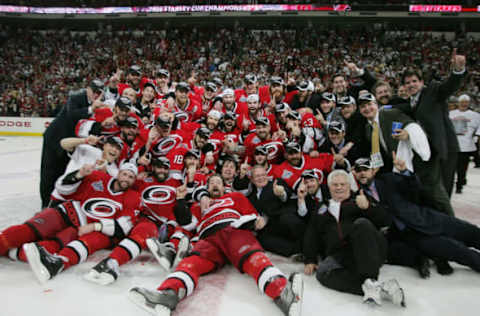
After a lockout canceled the 2004-05 season, the NHL came back with a salary cap and a handful of rule changes. With a handful of moves made during the downtime, the Carolina Hurricanes were poised to take advantage of the new-look league.
This is the ninth installment in my Rewind series, taking a look at the Carolina Hurricanes of seasons past. To check out my prior articles, click a season below:
Oh, boy. Sam Beckett-ism aside, the 2005-06 season was unreal. To be clear, I’m saying that purely as a fan. The ghosts of the “Greensboro Years” were still fresh in my mind. Despite a number of new additions and a renewed sense of hope, things didn’t start great for the Carolina Hurricanes. I’ll go ahead and tell you that this one will be a little long. After all, we’re looking back at the greatest season in Carolina Hurricanes’ history (up until now, at least).
Newly designated starter Martin Gerber was in net for the season opener in Tampa Bay and, while I’d like to tell you he got off to a great start, I don’t want to lie to you. Through two periods Gerber yielded 4 goals on 19 shots. Rookie Cam Ward relieved the shell-shocked starter for the start of the third and turned aside 10 out of 11 shots he faced, though Carolina’s offense managed just 2 goals on future Hurricanes’ backup John Grahame.
The first glimpse of what the team was capable of came two days later when they hosted the Pittsburgh Penguins in their home opener. Ward was called on to start and responded by stopping 28 of the 30 shots he faced. Eric Staal and Cory Stillman scored for Carolina and, with regulation drawing to a close, the fans in Raleigh were treated to one of the NHL’s new additions: the shootout.
This is where the fans’ love affair with Ward really started. The shootout saw Ward stop Mario Lemieux, Ziggy Palffy, and Sidney Crosby while Stillman and Matt Cullen scored, giving the Hurricanes a 3-2 win and their 21-year-old goalie an auspicious first start.
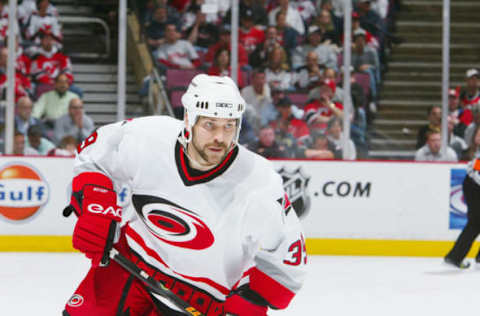
The First Big Trade
The Hurricanes were in the midst of a great season. Even with a 12-1 record in January, GM Jim Rutherford believed that the team could make a deep postseason run. To help that come to fruition, he swung a notable deal to bring in a very talented veteran:
The Blues also picked up a 2006 4th round pick, a 2007 4th rounder, and the rights to Erkki Rajamaki. This trade made quite an impression on me when it happened. Yes, the Hurricanes had signed Ron Francis and traded a disgruntled Keith Primeau for Rod Brind’Amour, both substantial moves in their own ways.
This, however, was a GM that went out and acquired a veteran with the explicit intent of gearing up for the playoffs. That was most certainly not the norm for the team and the move ratcheted up the excitement around what this team could be capable of.
Doug Weight played in 23 of the Hurricanes’ 31 remaining games during the regular season, picking up 13 points (4g, 9a). The 35-year-old veteran really shined in the playoffs, putting up 16 points (3g, 13a) in 23 games before being sidelined with a shoulder injury in Game 5 of the Stanley Cup Finals.
The most enduring memory of Weight with the Hurricanes is two-fold. In overtime of Game 6 of the Eastern Conference Finals against Buffalo, Weight was sent off on a boarding call less than 3 minutes in. As time wound down on his penalty, Daniel Briere scored the game-winner, tying the series and setting the stage for Game 7 at the RBC Center.
Mike Commodore opened the scoring for Carolina in the series-deciding game, with Weight picking up the primary assist. Despite the early tally, the Hurricanes went into the third period trailing the Sabres 2-1. As was the will of the Hockey Gods, it only took 1:38 for the home team to tie the game.
The player who scored the tying goal? Doug Weight.
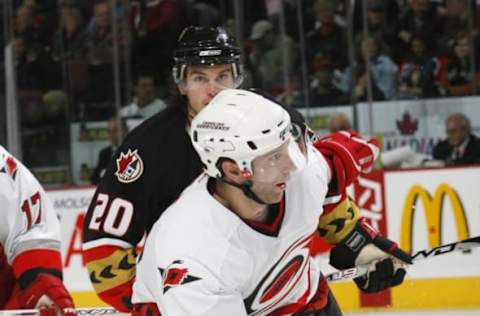
Public Enemy #1
Hurricanes fans have long memories.
Perhaps the longest-lasting testament of this is their booing of longtime defenseman Brooks Orpik anytime he touched the puck on Raleigh ice. While I don’t normally get into things like that, Orpik deserved every bit of derision that was shown to him. To get the full context, let’s take a look at a game from early March.
Carolina was rolling through the season, carrying a 41-14-4 record into a March 4th matchup with the Pittsburgh Penguins, a game that would end up being a very ugly affair.
Early in the third period, the Hurricanes held a 6-4 lead over the visiting Penguins. Winger Erik Cole was attempting to play the puck along the boards when Orpik hit him from behind, driving Cole’s head into the boards. While the game had been chippy up to that point (28 combined penalty minutes up to that point, including a fight between Mike Commodore and Andre Roy), Orpik’s hit completely darkened the tone of the game.
Cole, who had accumulated 30 goals (including 2 in this game) and 59 points, was left with a fractured vertebra and missed the remainder of the regular season and most of the playoffs. Orpik, meanwhile, was suspended for three games.
Yeah, three games.
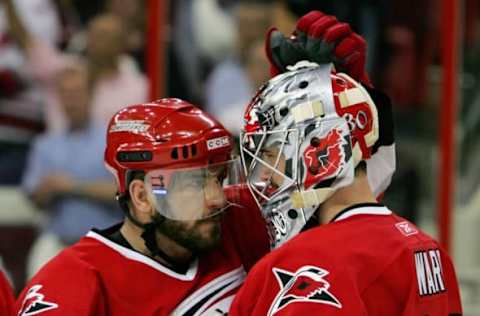
Bring in the Recching Ball
Five days after Cole’s injury, Rutherford made his second and final big in-season acquisition, bringing in another veteran for the playoffs:
Mark Recchi, unlike Doug Weight, came to the Carolina Hurricanes with a Stanley Cup on his resumé, though it came back in just his third season in the league. By the time he arrived, the 37-year-old was hungry for another.
An 8-time 30 goal scorer, Recchi was both an offensive threat and a smart player with a strong hockey I.Q. He played in all 20 games post-trade, notching 7 points (4g, 3a) and, like Weight, really came to life in the postseason.
Appearing in all 25 playoff games, Recchi picked up 16 points (7g, 9a), none bigger than the game-winner in Game 4 of the Stanley Cup Finals.
With Weight and Recchi in tow, the Hurricanes had an outstanding mix of youth and veterans as well as the necessary depth to not only overcome the loss of Erik Cole but to compete for hockey’s holy grail.
But, before we get to that, let’s take a look at how the offense, defense, and goaltending performed during the season.
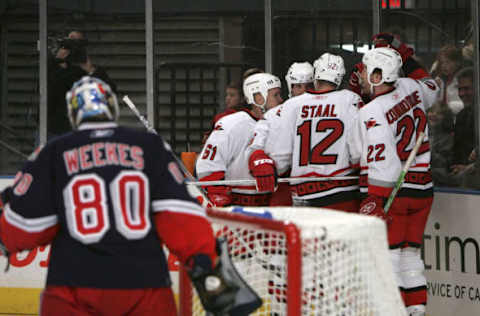
The Offense
After finishing dead-last in the NHL in terms of goals scored (172) during the 03-04 season, the Hurricanes exploded post-lockout. To help put into perspective just how much the team improved, Eric Staal’s goal total (45) was equal to the number of total points that led the team the previous season.
As a matter of fact, the top 7 scorers on this Hurricanes team all scored more than anyone on the 03-04 squad. If those two facts aren’t enough for you, consider that they also improved their goal total by 114. No, you aren’t misreading that, the team’s improvement alone was just 58 goals shy of matching the prior season’s total.
Staal’s ascendency was an absolutely huge part of that as he became the only player since the team relocated to hit the 100 point mark (the next closest was Ron Francis’ 77 points in the 2001-02 season).
The kid from Thunder Bay wasn’t alone, though. Justin Williams, acquired during the 03-04 season, had a career year. Even today, as the 38-year-old prepares to return to the team, his 76 points remain a career-high.
The Hurricanes’ power play also saw a dramatic improvement, rising 7% over its dismal performance in the season before. Staal and Brind’Amour shared the lead in power-play goals with 19 apiece. Not to squeeze blood from a stone, but that man-advantage goal total would have tied for the team lead in total goals the season before.
Anyway, let’s take a look at the team leaders and league rankings:
The Hurricanes scored 5 or more goals in 20 games, winning them all. They scored 8 goals on two occasions and 7 goals in three more.
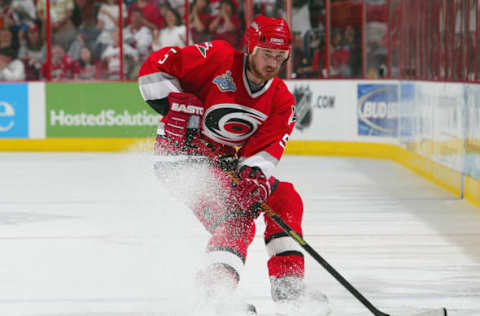
The Defense
While the offense grew by leaps and bounds, the defense didn’t quite keep pace. That said, a lot of it had to do with coach Peter Laviolette‘s wide-open style of play but the team did surrender 51 more goals than the season before and dropped one position in their league ranking.
Newcomer Frank Kaberle led the offense from the backend, his 44 points the highest total for a Hurricanes’ defenseman since Sandis Ozolinsh put up the same total five years before. Mike Commodore and his physical play led the team in penalty minutes by a wide margin, racking up 138 over 72 regular-season games.
The Hurricanes lacked a bonafide start on the blueline but what they possessed was a solid mixture of stay-at-home defenders and strong skating puck movers. It was more of defense by committee but it was effective instead of flashy.
The team surrendered 5 or more goals in 19 games, including a 9-0 rout at the hands of the Atlanta Thrashers in November. I had the displeasure of being at that game and, if the score wasn’t enough to do it, I can assure you that nothing about it was good. The Hurricanes record in those 19 games was an abysmal 3-13- 3.
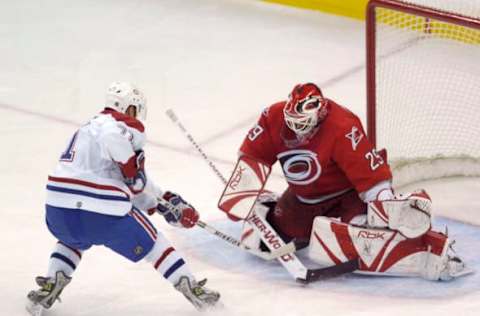
The Goaltending
The 2005-06 season marked a big change for the Hurricanes in net. Longtime starter Arturs Irbe was gone. Kevin Weekes, who had played well for Carolina, was also out. Assuming the starting role was Martin Gerber, who had been acquired from the Mighty Ducks three months before the lockout began.
The 31-year-old Gerber had plied his trade as a backup for two seasons in Anaheim. During his tenure there he put up very respectable numbers (2.14 GAA, .923 SV%, 3 SO) and seemed ready to take on a higher workload. He got his chance with the Hurricanes, appearing in 60 games (a number he would never match) and winning 38 of them (also a career-best). Gerber wasn’t dazzling for Carolina but, more often than not, he got the job done.
Serving as the backup to Gerber was 21-year-old Cam Ward. Ward had put up sparkling numbers with Lowell in the AHL during the lockout, going 27-17-3 with a 1.99 goals-against average and a .937 save percentage. Ward also notched 6 shutouts in 50 games.
While Ward would have great success in the playoffs, his regular season was nothing to write home about. Appearing in 28 games, he posted a 14-8-2 record with a goals-against-average of 3.68 and a save percentage of .882.
Whereas neither goalie set the world on fire, they did combine for 52 wins and the Hurricanes finished with a franchise-record 112 points, giving them the second see in the Eastern Conference and tying them with the Dallas Stars for the third-highest point total in the league.
- Martin Gerber: 38-14-6; 2.78; .906; 3 SO
- Cam Ward: 14-8-2; 3.68; .882; 0 SO
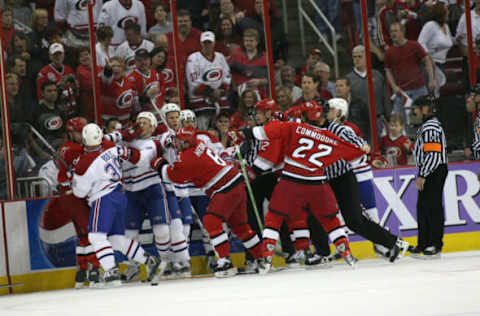
Eastern Conference Quarter-Finals
After what was a record season, the Carolina Hurricanes opened the Stanley Cup Playoffs against the 7th seeded Montreal Canadiens. Carolina finished 19 points higher than Montreal in the standings, scoring 45 more goals than their opponent. While their defense had been their biggest weakness, their relentless attack made the Hurricanes appear destined to make quick work of their first-round foe.
Funny how things work out.
Matt Cullen opened the scoring just 50 seconds in and it seemed that the Hurricanes’ onslaught had begun. This optimistic outlook was derailed by Cristobal Huet. The Montreal goaltender stopped 42 shots while his team took advantage of a discombobulated Gerber. At the final horn, the score read 6-1 in favor of the visitors and the Hurricanes were left scrambling to regroup.
Game two looked to be more of the same as Montreal jumped out to a 3-0 lead and chased Gerber from the net. With Ward finishing out the first, the team started to pick their game up. This carried over into the second period where goals from Cullen and Brind’Amour brought the Hurricanes to within one goal.
Things continued to improve in the third period as the home team opened up a 4-3 lead, thanks to a Ray Whitney tally as well as another from their captain. Montreal retaliated with 2 goals of their own to regain a one-goal lead. With 90 seconds remaining in regulation, Cory Stillman beat Huet to tie the game. With overtime on the horizon, the Hurricanes and their fans were reinvigorated. The push to tie the series was on.
Plenty of chances filled the first overtime session, though neither goaltender would yield and, with 80 minutes in the books, the game was still tied. As fate would have it, the second overtime was short-lived, coming to a close when Michael Ryder beat Ward at 2:32. The Canadiens headed home with a 2-0 series lead and the Hurricanes were left gut-punched and reeling.
Compared to the first two games, the third was much tighter and found the teams heading to overtime again with the score knotted at 1-1. Early in the extra frame, Montreal’s Tomas Plekanec went to the box for hooking and setting the stage for the Hurricanes to get back into the series. That’s exactly what they did when Staal fired a rocket from the high slot past Huet. Cam Ward stood tall in his first playoff start, stopping 27 out of 28 shots.
The Hurricanes went on to win the next three games, sealing Montreal’s fate and earning themselves a spot in the Eastern Conference Semi-Finals.
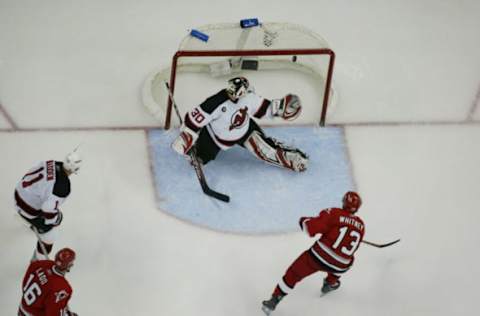
Eastern Conference Semi-Finals
In two out of their three visits to the postseason, the Carolina Hurricanes had squared off with the New Jersey Devils. The first matchup in the opening round of the 2001 playoffs went to New Jersey. The following spring bore witness to the Hurricanes returning the favor, ousting the Devils in six games on their way to the Stanley Cup Finals.
At first blush, it seemed like this could be a tough series for Carolina. New Jersey entered the second-round matchup on a 15 game winning streak after finishing the season strong and sweeping the New York Rangers in the opening round. Add to that the fact that the Devils had Martin Brodeur in goal and the outlook seemed to be a huge test for the Hurricanes.
All the momentum that New Jersey had evaporated as Carolina beat Brodeur six times, including five power-play tallies. It was evident that the Hurricanes had settled into a groove after finally finding their game.
Game two was much more tightly contested and almost ended up a heartbreaker for the Hurricanes faithful. Scott Gomez fired a knuckler past Ward, breaking a 1-1 tie with just 21 seconds remaining in regulation. While that could have completely deflated the Hurricanes, they opted to fight back.
After getting the puck deep into New Jersey’s defensive end a scrum ensued in the corner to Brodeur’s right side. Control was seized by Justin Williams, who fired a pass to Eric Stall at the edge of the crease. Staal swatted the puck past the future Hall of Famer, tying the game with three seconds left. The Hurricanes were headed back to overtime.
It was in this extra period that Nic Wallin cemented his place in Hurricanes’ lore. The Swedish defender took a pass from Brind’Amour at the Devils’ blueline and broke in on the right wing before driving hard to the net. A diving play by New Jersey defenseman Paul Martin caused the puck to slip off of Wallin’s stick blade and trickle between Brodeur’s legs as the goaltender moved to his right to keep pace with the attacker. The dramatic finish saw the Hurricanes take a 2-0 lead in the series as it shifted from Raleigh to East Rutherford.
Game three was another close battle that was tied at 2 in the waning minutes of regulation. While overtime looked like a certainty, Carolina followed their playbook from game two and continued pushing late into the third period. Once again it worked, this time with Rod Brind’Amour netting the game-winner and giving his team a three games to none stranglehold on the series.
The Devils came out firing in game four, determined to keep their postseason alive in front of their fans. A goal from Sergei Brylin 44 seconds into the second period gave New Jersey a 4-0 lead and sent Ward to the bench in favor of Gerber. The goaltending change did little for the Hurricanes as the Devils went on to win by a final score of 5-1.
While the loss stung, the Hurricanes were on home ice for game five with the chance to advance to the Conference Finals. Things started inauspiciously for Carolina when Brian Gionta put New Jersey on the board less than a minute into the game. Frank Kaberle evened things up, sending the game into the first intermission at a 1-1 tie.
Goals from Stillman and Whitney would give the Hurricanes a 3-1 lead before Staal sealed the game with an empty netter. The RBC Center crowd erupted as the clock reached zero, Carolina punching their ticket to the third round.
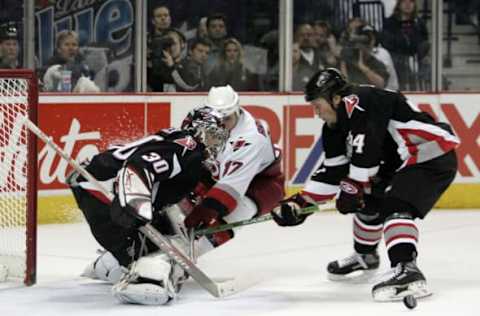
Eastern Conference Finals
While the second round was relatively easy for the Hurricanes, the last stop before the Stanley Cup Finals would be anything but. In Buffalo, Carolina met a team that could match their speed and, with just two fewer regular-season points than the Hurricanes, was in the midst of a great run.
Game one was close, with the Sabres leading 2-1 heading into the third. Jay McKee increased their lead to 3-1 before Mike Commodore drew the Hurricanes back to within one. That’s as close as Carolina would get as Buffalo held on for the win.
The second game played out in a similar manner, though it was the Hurricanes who carried a lead into the third period. Justin Williams scored just before the 7-minute mark, a goal that stretched Carolina’s lead to 4-1. The Sabres rallied, grabbing 2 goals in the third though they ultimately fell short, giving the Hurricanes a 4-3 win and evening the series at one game each.
Game three continued the trend, only with Carolina attempting a late comeback. It also marked another goaltending change as Gerber replaced Ward midway through the second after the rookie allowed 4 goals on 26 shots. Gerber held his ground but his teammates were unable to tie the game, losing a 4-3 contest and giving Buffalo a 2-1 lead in the series.
Gerber got the start in a crucial game four and made the most of it, stopping all 22 shots he faced. Carolina got goals from Recchi, Staal, Andrew Ladd, and Bret Hedican en route to a convincing 4-0 victory. The series was now 2-2 and demonstrated that momentum, insomuch as it exists in professional hockey, wasn’t interested in sticking with either team.
Gerber remained in goal to start the fifth game but only lasted until early in the second period when Buffalo opened up a 3-1 lead. Ward returned to the crease and the change seemed to reenergize the Hurricanes. Recchi and Brind’Amour each tallied to tie the game up as time in the second period ran out.
The third period offered no resolution so, once again, the Hurricanes headed to overtime. They built on their game, forcing the Sabres to walk a fine line between legal and illegal play. The dam broke at 7:12 when J.P. Dumont took a penalty for hooking. With the power play heating up, Cory Stillman beat Ryan Miller to seal a 4-3 victory and put Carolina in a position to close Buffalo out in six.
That didn’t happen.
Ward, who earned the start after Gerber’s game five falter, and Miller dueled it out with each goalie allowing but a single goal each. Any guesses what happened next? If you said “overtime”, you’re spot on. In a series that had seen similarities show up across games, it was Carolina’s turn to take a penalty in the extra period.
With Doug Weight off on a boarding call, Buffalo got a chance to flex their power play muscle. The Hurricanes had a strong kill and it looked like they would kill it off. Unfortunately, a shot from Daniel Briere fluttered past Ward and guaranteed a seventh game to decide the series.
Things started off well enough for Carolina in the final game. Mike Commodore scored just over halfway into the first period and the Hurricanes were on their way. Buffalo, however, refused to cede. The road team scored twice in the middle frame, including a goal from Jochen Hecht with the game clock at five seconds.
Unfazed, the Hurricanes pressed forward. Doug Weight, eager to atone for his untimely game six penalty, fired a pass from Ray Whitney past Miller. With the team re-energized, the attack continued. A delay of game penalty against Buffalo gave Carolina’s power play another chance to go to work.
As the man advantage neared the halfway point, Staal wristed the puck towards the goal from the blueline. As a scramble took place in the low slot, the puck trickled unnoticed towards the skate of Buffalo’s Rory Fitzpatrick. Well, almost unnoticed. Seeing the loose puck, Brind’Amour swooped in and fired a shot over Miller’s right arm and into the net.
Justin Williams delivered the final nail to the Sabres’ coffin 7:46 later, laying the groundwork for his mythical game seven status. Ward prevented Buffalo from chipping away at the lead and, as the clock struck zero, pandemonium set in.
The Carolina Hurricanes were headed back to the Stanley Cup Final.
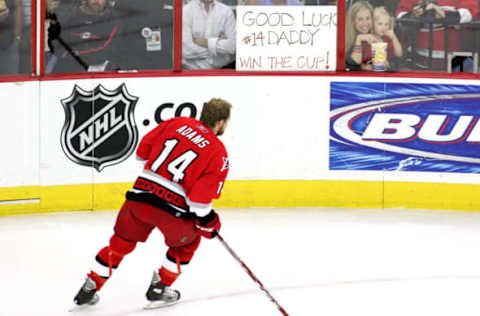
Setting the Stage
There were a lot of people throwing around opinions before the start of the 2005-06 NHL season. The league had lost an entire season, adopted new rules, and ratified a new collective bargaining agreement that included a salary cap. No one really knew what to expect, but that didn’t stop “experts” from making their attempts at prognostication.
For example, take a look at this quote from Sports Encyclopedia’s 05-06 prediction:
There is many questions surrounding the Hurricanes. Among them does anybody know they still exist? Does anybody care? Do they even have any fans? The Hurricanes will have plenty of time to ponder the questions as they play in an empty arena, as this Hurricane resembles a light drizzle.
While that is indeed a well thought out argument, the author wasn’t alone in their thinking. The Hurricanes weren’t expected to do much according to most. Without the gift of hindsight, you can see why there were reasons for doubt. The team was coming off of two bad, non-playoff seasons. Changes had been made, but it was too early to tell how they would pay off.
The Edmonton Oilers, Carolina’s dance partner in the finals, fared slightly better in preseason projections. They had added perennial all-star Chris Pronger to their blueline and he went on to post his best point production in six years. Edmonton also added veteran, two-way center Michael Peca before the season and a series of in-season moves brought in future Hurricanes Jaroslav Spacek and Sergei Samsonov.
The biggest move that the Oilers made during the season was the acquisition of goaltender Dwayne Roloson. The 36-year-old played okay for Edmonton down the stretch but his true value didn’t come to the fore until the playoffs got underway.
After edging out the Vancouver Canucks for the eighth and final playoff spot, Edmonton opened their postseason against the league-leading Detroit Red Wings. To say it was a daunting challenge is putting it mildly. Detroit finished 29 points higher in the standings, scoring 49 more goals than the Oilers while allowing 42 fewer.
Despite the apparent imbalance, Edmonton ousted the heavily favored Red Wings in six games. From there, they beat the San Jose Sharks (also in six) before a convincing five-game series win against Anaheim in the Western Conference Finals.
From there, they waited for their opponent in what would be their first Stanley Cup Finals appearance since 1990.
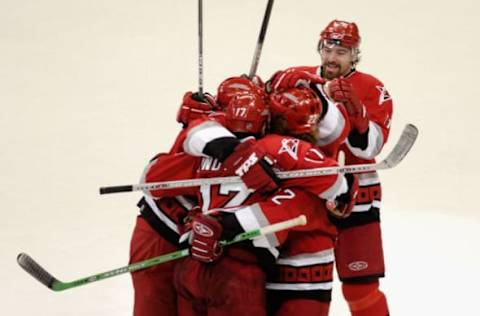
Building their game in the Final
Unlike their first trip four years prior, the Carolina Hurricanes came into the 2006 Stanley Cup Final as the favorite. For the players who remained from the 2002 team, the memory of that defeat loomed large and represented an outcome they didn’t want to repeat.
Edmonton, however, had their own plans. The visitors from Alberta came out strong and carried a 3-0 lead into the late stages of the second period. Things in Raleigh looked bleak until Rod Brind’Amour did what he had throughout the playoffs: gave the Hurricanes life. With 2:43 remaining in the second, the captain netted his 10th goal of the postseason and drew his team to within two.
That proved to be just the spark that Carolina needed and they rolled through the first half of the third period. Two goals from Ray Whitney and a shorthanded tally from Justin Williams gave the Hurricanes a 4-3 lead. Ales Hemsky scored a power-play marker to even the score and made overtime look all but inevitable.
Then things changed. Andrew Ladd was driving the net when Edmonton defender (and another future Hurricane) Marc-Andre Bergeron tied him up, leading to a collision with Roloson. The injury he sustained would keep him out for the remainder of the series, dealing a huge blow to Edmonton’s hopes.
With Roloson out, Edmonton backup Ty Conklin was pressed into action and, well, he definitely made an impression. With the clock running down towards 30 seconds, Commodore dumped the puck down the ice from his own blueline. Conklin came out to play it behind his net only to suffer a catastrophic miscommunication with Oilers’ captain Jason Smith. A forechecking Brind’Amour cut behind the dazed goalie, collected the puck, and deposited it into the vacant net.
The Hurricanes’, again led by their captain, had completed a solid comeback and taken game one.
Game two featured Jussi Markkanen, Edmonton’s third goalie of the series. This game was a reverse of the opener as the Hurricanes built up a 3-0 lead for the start of the third period. To the chagrin of Edmontonians, there would be no rally in this game. Carolina added two more goals and Ward turned aside all 25 shots that he faced, earning a 5-0 win and a 2-0 series lead.
On to Edmonton.
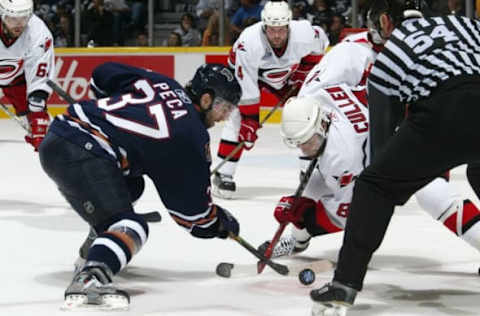
Back and forth and back again
The Oilers came home facing a steep challenge if they were to claim their first Stanley Cup championship in 16 years. They were down 0-2, they had lost the goalie who had carried them through the first three rounds, and had just been routed in game two.
Shawn Horcoff scored early in the first, giving fans hope and his team life. After a choppy second period, Edmonton maintained a 1-0 lead until Brind’Amour (who else?) tied things up just over nine minutes into the third. Ryan Smyth broke the tie with 2:15 remaining, giving the Oilers a lead they would not relinquish, as they held on for a 2-1 victory.
The Hurricanes quickly bounced back in game four, picking up their own 2-1 win thanks to goals from Stillman and Recchi. They now had the chance to hoist the Cup in front of their fans on their home ice.
The excitement was palpable as the opening faceoff of game five arrived. The game itself was full of action and featured each team battling to hold the lead. It proved to be for naught as the game went to extra time, the seventh such game for the Hurricanes during their playoff run.
Then, at 3:03 of overtime, Edmonton defender Steve Staios was penalized for tripping. The Hurricanes had an overtime power play with the chance to win it all. Those in attendance that were not already standing rose to their feet; there was little doubt that the game was about to end.
It did, but don’t pop the champagne just yet.
With the puck in the Hurricanes’ zone, Cory Stillman tried to hit Eric Staal with speed at the blueline. The puck left Stillman’s stick with a lot less zip than he would have liked and was picked off my Edmonton’s playoff hero Fernando Pisani who skated in and beat Ward. The Oilers had lived to fight another day, leaving a stunned RBC Center crowd to digest what had just happened.
Carolina had been gut-punched but hadn’t bottomed out.
Yet.
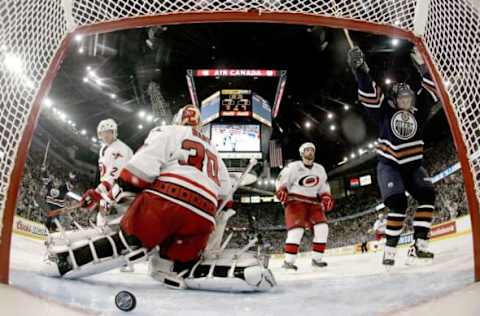
Bottoming Out
From the drop of the puck in game six, you could tell that something was off with the Hurricanes. Erik Cole, out since early March, returned to the lineup while Doug Weight was out after suffering a shoulder injury in game five. Despite Cole’s return, Carolina couldn’t muster much in the way of offense.
The first period came and went without either team getting on the board. That wouldn’t last. Pisani picked up his 13th goal of the postseason early in the second and the Oilers were off and running. Raffi Torres made it 2-0 for Edmonton, a score that would hold until the start of the third period.
Smyth and Horcoff padded the Oilers’ lead and Markkanen stayed perfect. Not only had they had their way with the Hurricanes but they had clawed their way to a decisive game seven after trailing the series 3 games to 1.
There wasn’t much to remark about for the Hurricanes. Cam Ward did the best that he could but received no support. Carolina allowed 34 shots against while only managing 16 of their own. They also picked up 10 minor penalties, yielding 3 power-play goals to the Oilers.
Edmonton seemed to have all the momentum as the series shifted back to Raleigh. The demons that were plaguing the Hurricanes had to be exorcised and quickly if they wanted to keep their championship hopes alive.
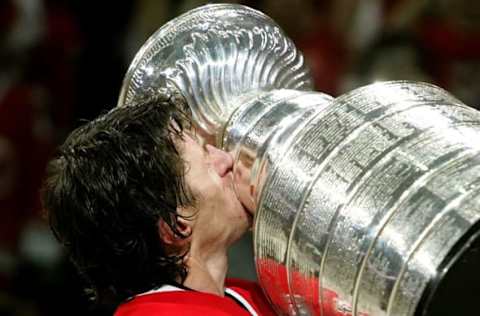
Critical Acclaim
Despite a shocking loss in game five and a poor showing in game six, the Hurricanes had reason to hope. They had demonstrated throughout the season that they could never be counted out. They were also going to take the ice in front of a raucous, standing-room-only crowd at the RBC Center.
Carolina fed off of the energy early and set the tone for the game when Aaron Ward stepped into a loose puck and fired it past Markkanen. Then came the controversy. With time about to expire in the first and a delayed penalty against the Oilers forthcoming, the Hurricanes thought they had scored. Replays showed that Edmonton’s Steve Staios appeared to cover the puck in the crease which would be a violation that would result in Carolina being awarded a penalty shot.
None of that happened. The puck didn’t cross the line and it was ruled that Staios touching the puck (without his stick) counted as possession meaning the play was dead and the Hurricanes went on to have an uneventful power play.
At least that one.
Carolina was back on the power play early in the second. A failed Oiler clearing attempt led to the puck finding Frank Kaberle at the top of the faceoff circle and he wasted little time firing a shot on goal. The puck glanced off of a sliding Jason Smith and past Markkanen, giving the Hurricanes a 2-0 lead.
Ward had remained unblemished until a tenacious rush early in the third. He turned aside shots from Rem Murray and Torres before Pisani (who else?) chipped the puck over Ward and put Edmonton on the score sheet. The Oilers had refused to roll over and die and this tally set up a wild finish.
Down a goal, Edmonton coach Craig MacTavish pulled Markkanen for an extra attacker. The Oilers were able to hold the puck in intermittently as time was eaten away. The Hurricanes did a superb job of swarming the puck, not giving their opponent a chance to set up any type of play. As the clock neared the one-minute mark, Hedican cleared the puck along the boards to Staal who then found a streaking Williams who delivered the death knell.
More scrapping followed though the game was all but over. The final horn went and the players swarmed Ward. The journey from relocation to struggling to establish a foothold in their new home state to Stanley Cup Champion was surreal. Watching the games again now still hits me and my eyes still well up when I hear Mike Emrick proclaim that “The Carolina Hurricanes have won the Stanley Cup!”
Also, who doesn’t love watching Rod grab The Cup before Gary Bettman could properly present it to him? The absolute, unbridled joy is overwhelming.
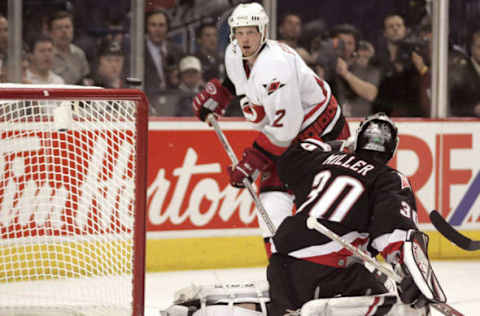
Top Playoff Performers
Eric Staal continued his breakout season in the playoffs, establishing himself as the leading offensive weapon of the Carolina Hurricanes. Cory Stillman, who had been signed with little fanfare, followed up his second-best offensive season with an outstanding postseason run.
Perhaps the biggest catalyst was Rod Brind’Amour. The captain led his team in playoff goal scoring and always had an answer when the Hurricanes needed it. His impact was enough that he was mentioned as a strong possibility to claim the Conn Smythe Trophy as playoff MVP, an honor that ended up going to Carolina’s rookie netminder.
In-season additions Doug Weight and Mark Recchi each chipped in 16 points while Frank Kaberle led the defense with 13 points, including the Cup-clinching tally in game seven. There were no passengers on this team, a statement that should come as no surprise given the work ethic of their captain.
The Cup win also marked the first championship for a number of veterans; Brind’Amour, Glen Wesley, Doug Weight, Ray Whitney, and Bret Hedican had played a combined 71 seasons before the 2005-06 campaign, led by Wesley’s 17.
Top 5 Playoff Scorers:
- Eric Staal: 9-19-28
- Cory Stillman: 9-17-26
- Rod Brind’Amour: 12-6-18
- Justin Williams: 7-11-18
- Matt Cullen: 4-14-18
Playoff Goaltending:
- Cam Ward: 15-8; 2.14; .920; 2 SO
- Martin Gerber: 1-1; 3.52; .856; 1 SO
Next. Examining the Hurricanes' Goalie Situation. dark
So, longtime Caniacs, how surreal was 2005-06 to you? How often do you revisit that playoff run?